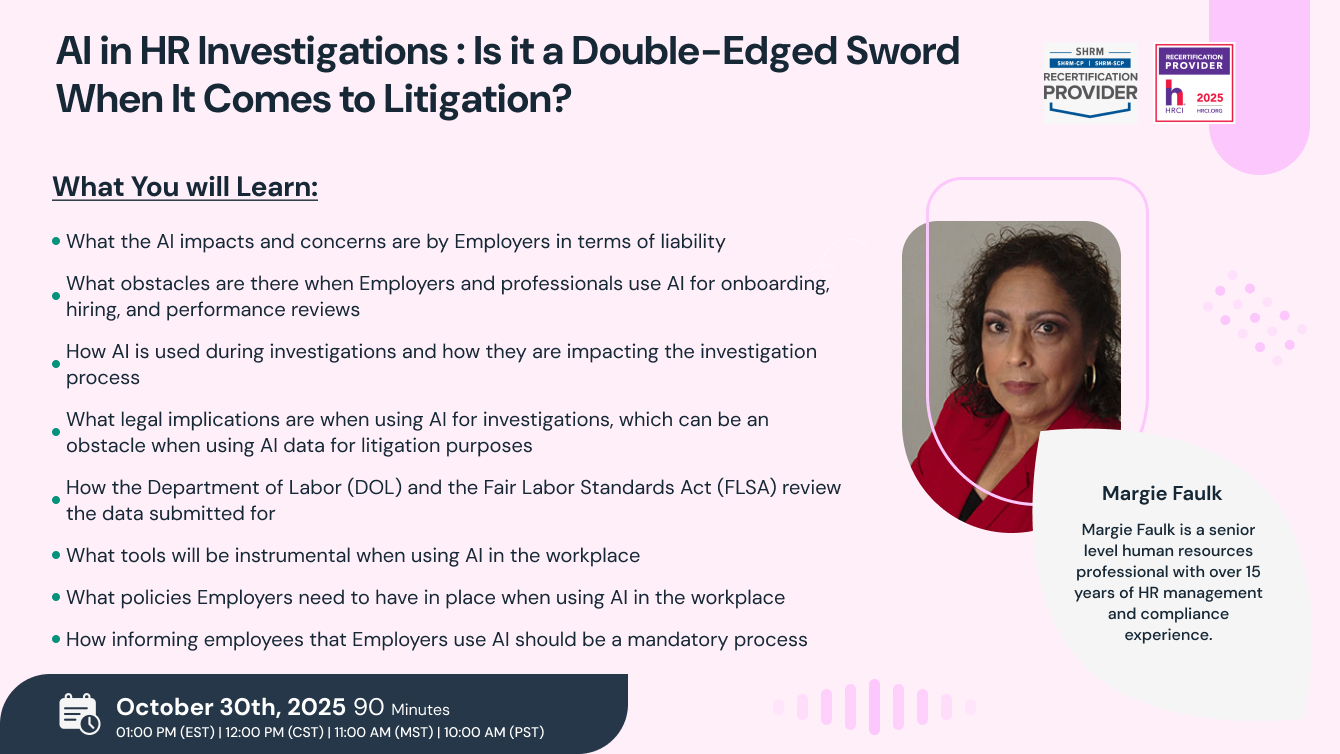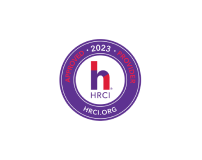Overview:
The term “artificial intelligence” might be the phrase of 2025. It’s written and spoken about virtually everywhere by practically everyone, and it essentially markets itself as the newest, shiniest, and most efficient tool for every industry to consider and put into practice.
But the term “artificial intelligence” is quite broad. The definition of AI is broadened even further when considering that different technologies can be combined to create new AI systems. Despite the ever-expanding definition of AI, it is important to take inventory of the different types of AI to determine which, if any, is best suited for a workplace investigation.
How AI Can Help in Workplace Investigations
· Data management, analysis, and pattern recognition. Deploying AI in a workplace investigation can streamline an often long and intensive process by organizing, synthesizing, and digesting large amounts of data.
· Because AI tools are analyzing documents while sorting, an investigator can employ searches to identify information such as patterns, involved parties, and problematic documents, allowing for the creation of visual timelines of the event.
Compliance Considerations and Concerns with AI
· State laws, federal laws, and discrimination liability.
· Some states have started to enact legislation that regulates the use of AI in the workplace
· In addition, the U.S. EEOC Commission issued guidelines reinforcing the principle that investigators can be held liable for discrimination, even when it results from the use of AI.
Areas covered in this Training:
· What the AI impacts and concerns are by Employers in terms of liability
· What obstacles are there when Employers and professionals use AI for onboarding, hiring, and performance reviews
· How AI is used during investigations and how they are impacting the investigation process|
· What legal implications are when using AI for investigations, which can be an obstacle when using AI data for litigation purposes
· How the Department of Labor (DOL) and the Fair Labor Standards Act (FLSA) review the data submitted for
· What tools will be instrumental when using AI in the workplace
· How having the “Human Element” when using AI for investigations and other workplace compliance initiatives is mandatory when using AI in the workplace
· What policies Employers need to have in place when using AI in the workplace
· How informing employees that Employers use AI should be a mandatory process
Why attend this Training:
Investigators using AI in employment investigations continue to expose themselves to liability under the FLSA, FMLA, and Employee Polygraph Protection Act, depending on the recommendation resulting from the investigation. Employers need to be aware of how they utilize AI in the workplace will determine their liability and litigation impact.
Suggested Attendees:
· All Employers
· Business Owners
· Company Leadership
· Compliance professionals
· HR Professionals
· Managers/Supervisors

Margie Faulk
Margie Faulk is a senior level human resources professional with over 15 years of HR management and compliance experience. A current Compliance Advisor for HR Compliance Solutions, LLC, Margie, has worked as an HR Compliance advisor for major corporations and small businesses in the small, large, private, public, Non-profit sectors and International compliance. Margie has provided small to large businesses with risk management strategies that protect companies and reduces potential workplace fines and penalties from violation of employment regulations. Margie is bilingual (Spanish) fluent and Bi-cultural. Margie’s area of expertise includes Criminal Background Screening Policies and auditing, I-9 document correction and storage compliance, Immigration compliance, employee handbook development, policy development, sexual harassment investigations/certified training, SOX regulations, payroll compliance, compliance consulting, monitoring US-based federal, state and local regulations, employee relations issues, internal investigations, HR management, compliance consulting, internal/external audits, and performance management. Margie’s unique training philosophy includes providing free customized tools for all attendees. These tools are customized and have been proven to be part an effective risk management strategy. Some of the customized tools include the I-9 Self Audit. Correction and Storage program, Ban the Box Decision Matrix Policy that Employers can provide in a dispute for allegations, Family Medical Leave Act (FMLA) Compliance Guide, Drug-Free Workplace Volatile Termination E-Book and other compliance program tools when attendees register and attend Margie’s trainings. Margie holds professional human resources certification (PHR) from the HR Certification Institution (HRCI) and SHRM-CP certification from the Society for Human Resources Management. Margie is a member of the Society of Corporate Compliance & Ethics (SCCE).

SHRM -
Standeagle is recognized by SHRM to offer Professional Development Credits (PDCs) for the SHRM-CPSM or SHRM-SCPSM. This program is valid for 1.5 PDCs for the SHRM-CPSM or SHRM-SCPSM. For more information about certification or recertification, please visit - portal.shrm.org.

HRCI -
This webinar has been approved for 1.5 HR (General) re-certification credit hours toward California, GPHR, HRBP, HRMP, PHR, and SPHR recertification through the HR Certification Institute.
The use of this seal is not an endorsement by the HR Certification Institute of the quality of the activity. It means that this activity has met the HR Certification Institute’s criteria to be pre-approved for re-certification credit.

ACCREDITATIONS


